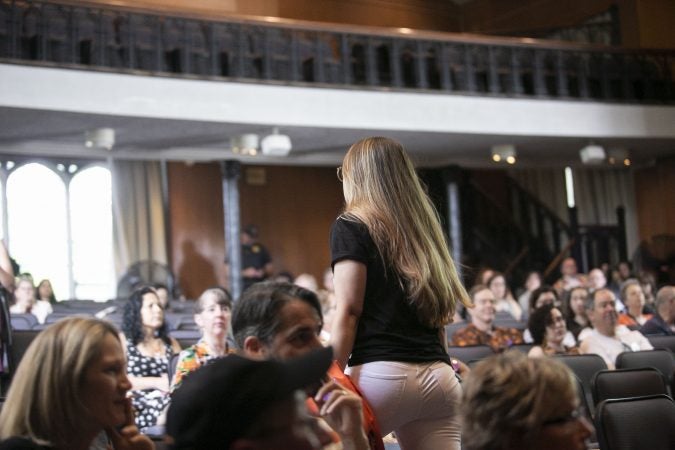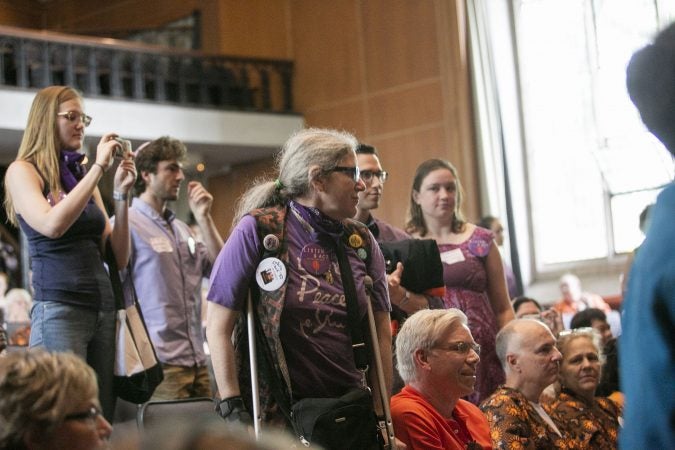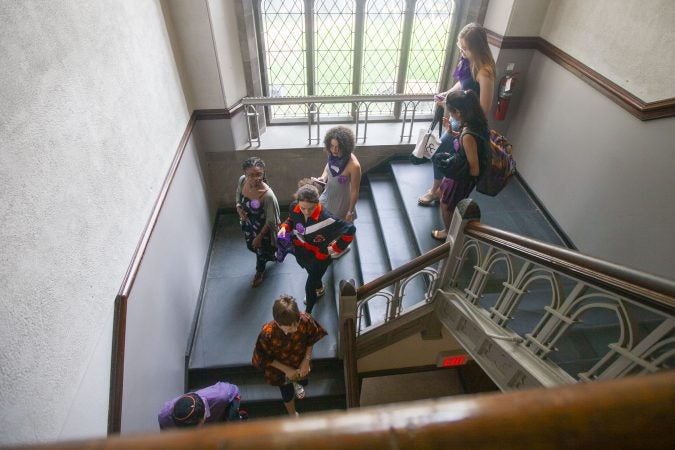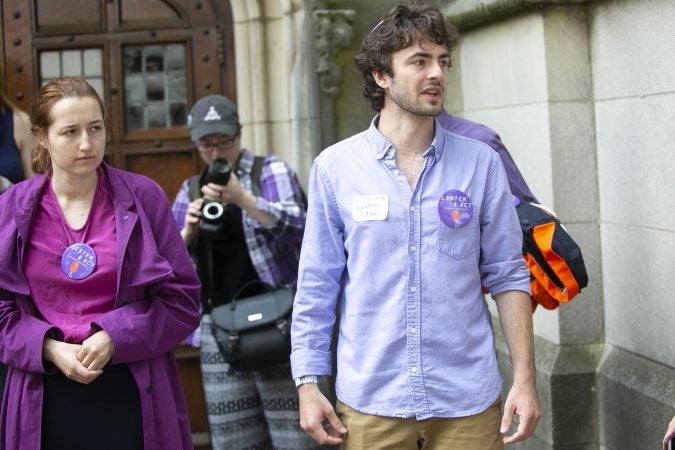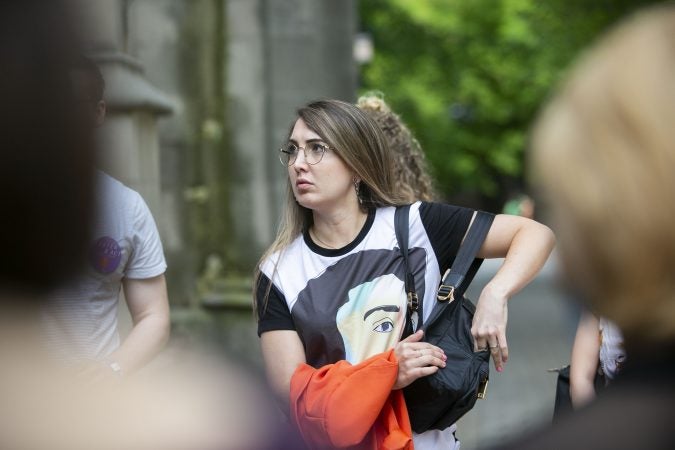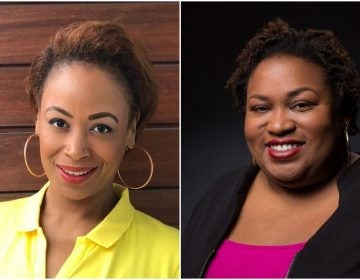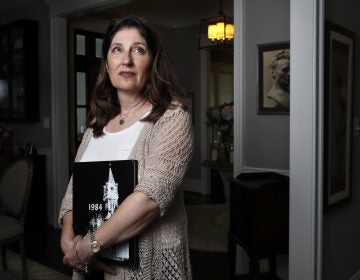Princeton alumni, students protest over panelist representing Brett Kavanaugh
Supported by a student group demanding Title IX reforms, a panel member walked out over the inclusion of a lawyer representing Justice Brett Kavanaugh.
-
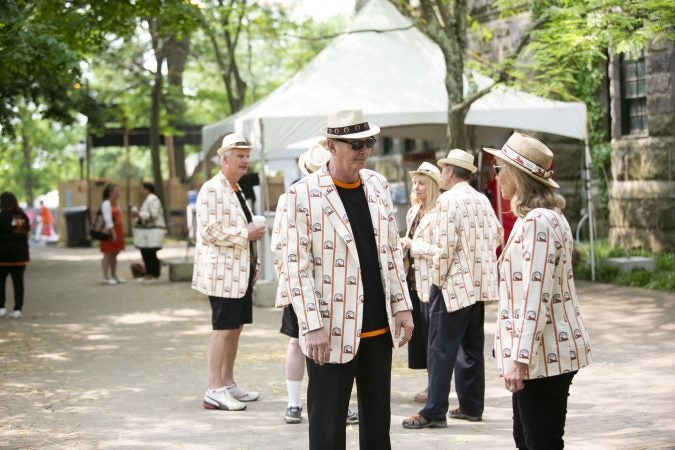
Princeton University campus turned orange as they celebrate 2019 reunion on June 1, 2019 in Princeton, New Jersey. (Miguel Martinez for WHYY)
-
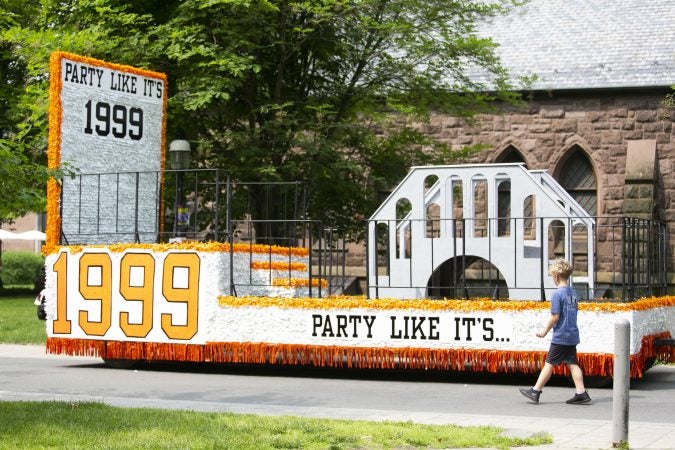
Princeton University campus turned orange as they celebrate 2019 reunion on June 1, 2019 in Princeton, New Jersey. (Miguel Martinez for WHYY)
-
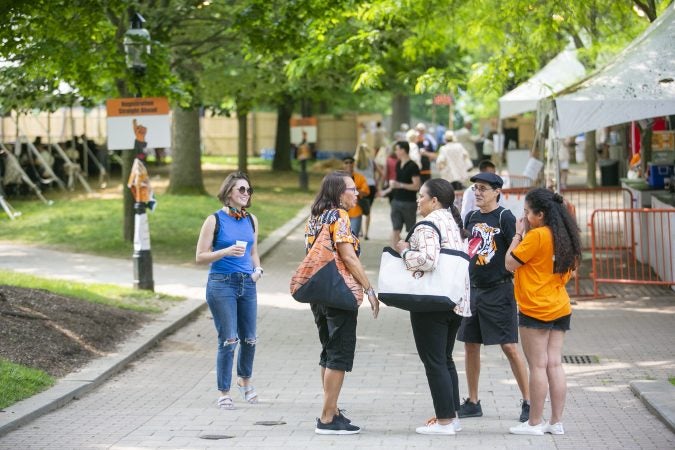
Princeton University campus turned orange as they celebrate 2019 reunion on June 1, 2019 in Princeton, New Jersey. (Miguel Martinez for WHYY)
Some Princeton alumni walked through campus Saturday sporting orange, pin-striped suit jackets and passing floats that read “Party like it’s 1999.” Others, however, took the Ivy League institution’s reunion weekend celebration as an opportunity to voice protests about sexual harassment and misconduct.
As part of the reunion weekend — a longstanding tradition that brings about 25,000 alumni from several classes back to the university each year — dozens of alumni-faculty forums are organized by alumni volunteers to discuss current topics, such as immigration, inequality or artificial intelligence.
This year, one of those forums delved into the #MeToo movement.
Panelists included Kellen Heniford, a Ph.D. candidate at Columbia University and a 2014 Princeton alumna; Rachael Wong, a 1994 alumna and founder of Hawaii-based nonprofit One Shared Future; and Beth Wilkinson, a 1984 alumna and founding partner of the Washington, D.C., law firm Wilkinson Walsh + Eskovitz.
Wilkinson is also known as the attorney representing Supreme Court Justice Brett Kavanaugh and Virginia Lt. Gov. Justin Fairfax, both of whom have faced accusations of sexual misconduct.
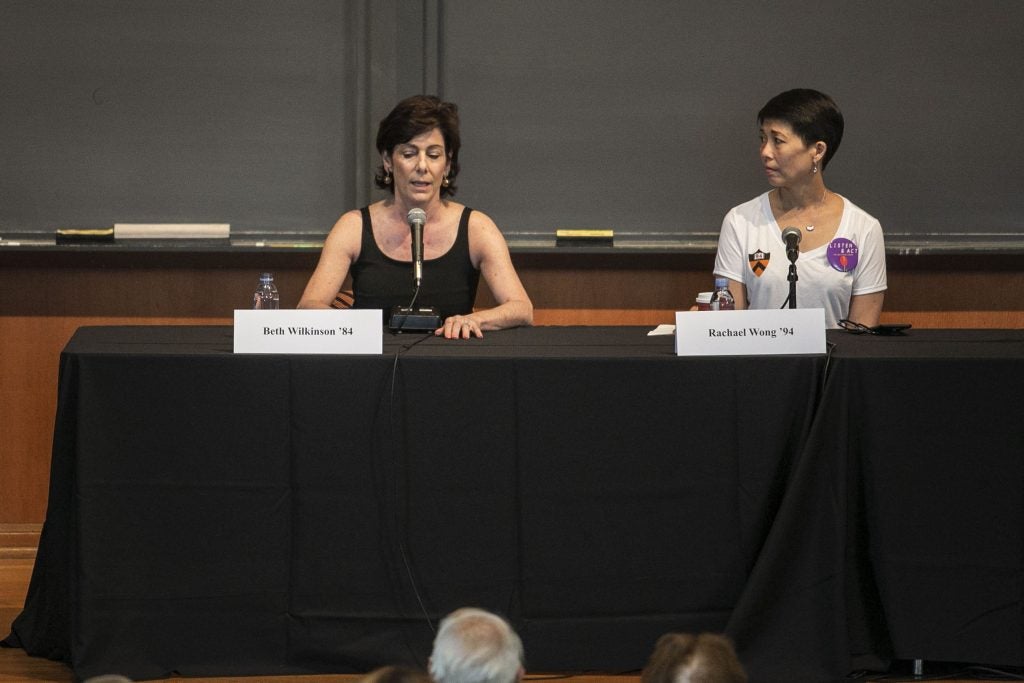
It was Wilkinson’s inclusion on the panel that caused Heniford and dozens of other alumni and current students to walk out during the early minutes of the forum Saturday morning.
“I did not anticipate that the Alumni Affairs Office’s version of ‘both sides’ on the #MeToo issue would look like this — survivors and their defenders somehow pitted against a prominent defender of a prominent man accused of abuse,” Heniford said as she read a written statement to those in attendance.

“[Wilkinson] has every right to defend Brett Kavanaugh on network television, and every right to speak on a panel to which she is invited,” Heniford added. “I am exercising that same right to free speech now, as I tell you why I object to being put in this position, and why I think this panel is another example of how Princeton abdicates its responsibility to survivors.”
At the end of her speech, Heniford, herself a survivor of sexual violence, walked off the panel and out of the auditorium with others who felt wronged by the university’s decision to include Wilkinson on the panel.
Wilkinson declined to comment to WHYY, but did remain on the panel after the walkout. Later in the discussion, a member of the audience asked Wilkinson how people like her who are representing alleged perpetrators can help survivors of sexual misconduct.
Holding people accountable in their workplaces is a good first step for those in her shoes, Wilkinson said. Personally, she said, she’s seen the way people act differently in the workplace when two women’s names are on the door of her law firm.
“You can ensure that these kinds of policies and procedures and safe places are set up, but I don’t think it’s proper really for someone who is an advocate for a system while you’re representing someone,” Wilkinson said. “That’s why it’s difficult. You’re there to represent your client. I do think you can be respectful to the victims, and I think that’s for whether it’s a sexual-harassment case or anything else.”
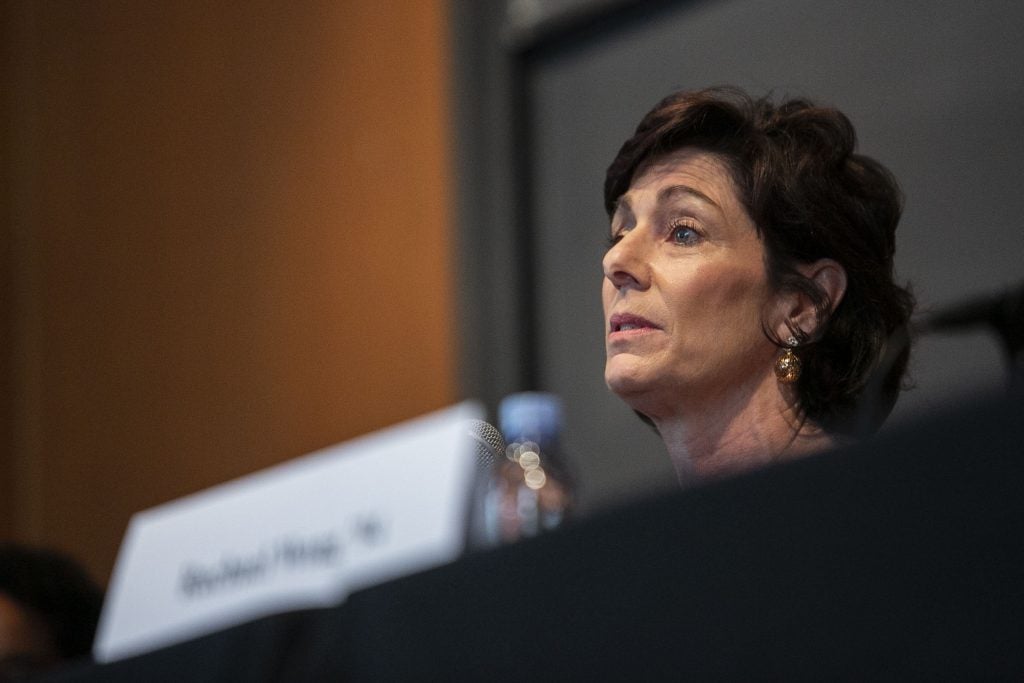
Saturday’s walkout took place in the shadow of protests by Princeton IX Now, a newly formed student coalition that is calling for changes to the university’s Title IX procedures for handling cases of sexual misconduct on campus. The group also called for programs it said would address some root causes of sexual violence on campus, such as the creation of a gender and sexuality studies department.
In May, Princeton IX Now hosted a 200-hour sit-in outside the university’s venerable Nassau Hall.
In 2014, the U.S. Department of Education found that Princeton — among many other universities — was not in compliance with Title IX, the federal law that prohibits sex discrimination at colleges receiving federal funding. Michael Hotchkiss, a university spokesman said that every requirement in the agreement has since been met and documented with the Department of Education.
Jamie O’Leary, a senior at Princeton and organizer with Princeton IX Now, said being a visible group on campus during the reunion weekend offered the chance to connect with alumni who may have had issues with Title IX proceedings at Princeton in the past.
“We’ve seen that this is a problem that has been persistent throughout the years and has changed but also has stayed the same in the sense that the administration’s response to it has not ever been sufficient,” O’Leary said.
She added that over 1,400 people have signed a petition stating they won’t contribute to Princeton’s annual giving fund until the students’ demands for reforms are met.
A spokesman for the university said Princeton is taking several steps to address any issues students experience while reporting sexual misconduct on campus. An external review of the Title IX program was approved by Princeton president Christopher Eisgruber.
In May, a joint committee of students and faculty outlined the next steps to be taken to address students’ Title IX concerns. Additional meetings with the students are planned for this summer, and the university plans to release a full report examining its Title IX process in the fall.
Navigating free speech, safety
O’Leary said she was “horrified” when she heard Wilkinson was going to be on Saturday’s panel, but also wasn’t surprised.
“This is a pattern of behavior from Princeton and from administrators of disrespecting survivors and putting them in positions where they’re having to defend their humanity,” O’Leary said.
In a written statement, a Princeton spokesman said the university takes seriously its mission “to support the free expression of all views.” But O’Leary said this isn’t a free speech issue.
“Yes, Beth Wilkinson has the right to speak, but she doesn’t have to be in every space, and she certainly should not be in the space where survivors’ voices are being centered,” O’Leary said.
Heniford said that she recognizes that on some issues that can be polarizing, Princeton’s hands are tied. But with something like sexual assault on campus, she said, Princeton, and many schools across the country, fail to consider the health and safety of survivors.
“The panel is demonstrative of this fact: that survivors are actually more dangerous to universities than sexual violence is,” Heniford said. “Unless sexual violence is especially horrific and unusually public, universities are much more threatened by survivors who talk afterwards.”

For Heniford and O’Leary, the silver lining to any outcome of their walkout is being able to connect to members of the Princeton community over a common goal.
“I didn’t want to walk out alone … so reaching out to the students was an easy decision,” Heniford said of Princeton IX Now. “They wrapped me in wholeheartedly to their community. I have been so impressed with the critiques that they have made. They are so sharp, they are so incisive … they are incredibly kind to me.”
“As one of their professors said at the beginning of the panel, they likely have learned more from this than their other scholarship at Princeton,” she added. “These are really valuable lessons, and I’m really proud of them for the work they’ve been doing.”
Editor’s Note: This story has been updated to reflect that after a 2014 investigation, Princeton University was found in compliance with Title IX as it applies to sexual harassment and violence.
WHYY is your source for fact-based, in-depth journalism and information. As a nonprofit organization, we rely on financial support from readers like you. Please give today.



